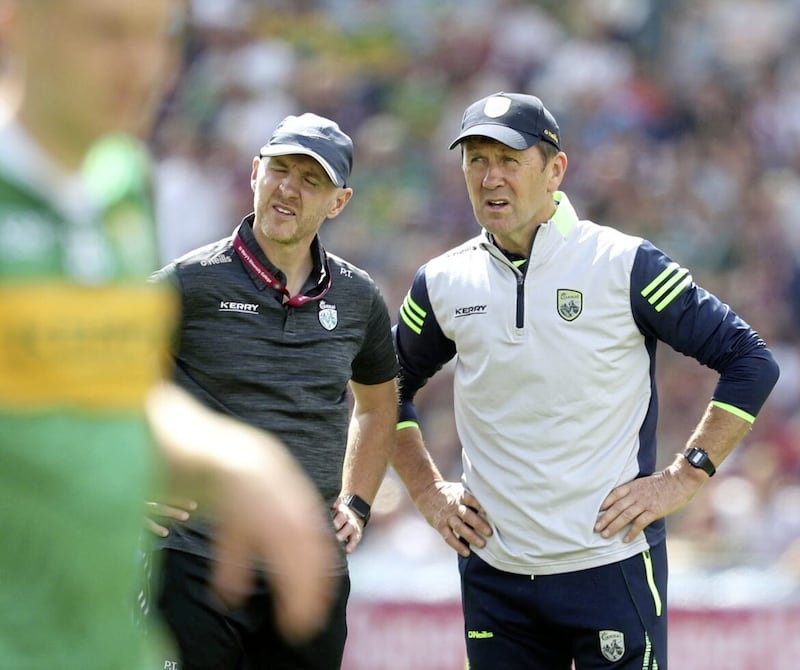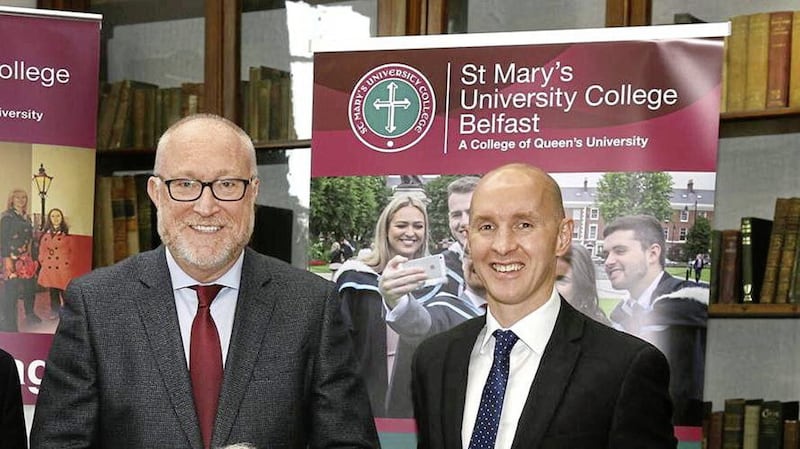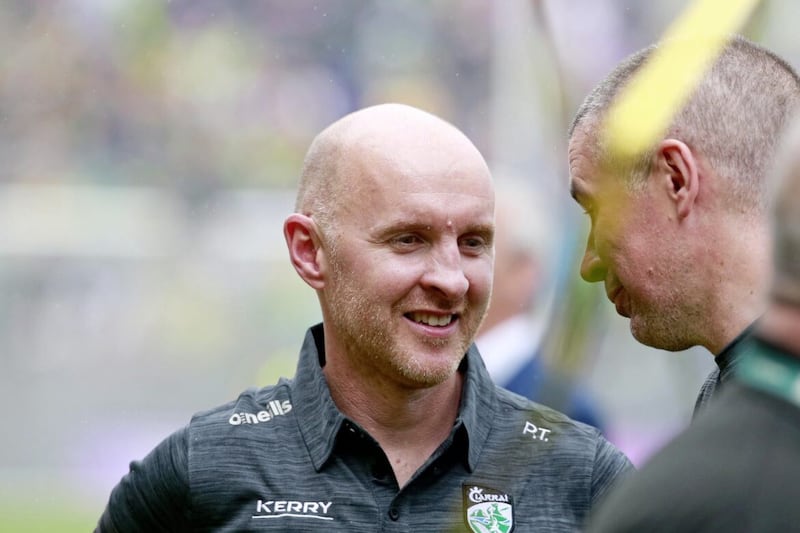“Well, whenever Paddy Tally came in as trainer of the Tyrone senior team, a lot of people questioned his credentials. Paddy, for the rest of your life, you can now say you trained the All-Ireland champions.” Peter Canavan, Croke Park, 2003
That would have been more than enough for many men, making an historic breakthrough for his own county.
Paddy Tally, though, is always seeking improvement, always hungry for more success.
Nineteen years on from that acceptance speech by Red Hands captain Canavan, the Galbally man once again coached the All-Ireland champions, but this time it was Kerry.
- "Winning. Just winning." - Paddy Tally wants current Down crop to forge their own tradition
- "Paddy is a very clever coach..." Kerry boss O'Connor hails influence of Tyrone native Tally on National League champions
- Paddy Tally has improved my game: Kerry defender Jason Foley
For a man rightly credited with an important role in his county’s historic All-Ireland senior football championship breakthrough, Paddy Tally still flies under the radar.
His short Wikipedia entry says he was ‘born 1970s’. There’s no mention of his three seasons as a coach with Derry. Nor that he plays guitar at staff functions.
To a large extent, Paddy Tally remains an inter-county man of mystery.
Sure, that first success with his native Tyrone in 2003 was 20 years ago. However, since then he helped Down to their only All-Ireland Final since the 90s, in 2010, moved on to coach Derry, and was Galway coach when the under-achieving Tribesmen reached the Super Eights five years ago.
He returned to Ulster to manage Down for three seasons, 2019 to 2021, before leaving despite passing a vote of confidence from the clubs, apparently unhappy that the level of backing was not stronger.
Down’s loss was definitely Kerry’s gain.
He’s with the kingpins of Gaelic football, assisting the returning Jack O’Connor as the Kingdom regained their throne last season after an eight-year wait, defeating Galway in the decider.
Ironically, although he never seeks attention, Tally has always been accommodating with the media, particularly to promote his beloved St Mary’s University College, whom he led to a Sigerson Cup triumph in 2017.
However, he prefers to talk about his team, his players, rather than himself.

The rumour mill long ago labelled Paddy as the man from the north who assisted O’Connor in transforming Kerry’s tactics and approach after seismic defeats in the All-Ireland series by Armagh in 2002 and, particularly, Tyrone in the 2003 semi-final.
Paddy parted ways with Red Hands manager Mickey Harte in 2004, with the Ballygawley man alleging Tally was going beyond his remit into team selection matters.
Tally has always held his counsel on that. His next public inter-county role was in Ulster; having been brought into the Down set-up in late 2008 by Ross Carr, the latter’s successor, James McCartan Jr, retained Tally’s services.
The Mournemen earned consecutive promotions in 2009 and 2010, reaching Division One, but it was still unexpected when they got to the 2010 All-Ireland Final, only to be pipped by a point by Cork. Probably their best performance was dumping out All-Ireland champions Kerry in the quarter-finals.
Tally moved on to Derry in late 2012, when Brian McIver took on that Oak Leaf role, working there for three seasons, during which they lost the 2014 Division One Final to reigning All-Ireland champions Dublin. The Derry stint ended when McIver resigned after an All-Ireland qualifier loss to Galway in Salthill.
Tally came back into wider prominence in 2017 when he led an unfancied St Mary’s side to a Sigerson Cup triumph, dethroning UCD in the final, having come back from conceding two early goals in the semi-final against UCC, scoring a late second goal of their own to edge that match.
That was only St Mary’s second Sigerson success, ending a 28-year wait – and a 14-year absence from even the last four of the competition.
Another deep thinker about Gaelic football, Kevin Walsh, came calling later that year and Tally brought steel and solidity to a Galway team previously regarded as a soft touch.
Tally acknowledged that his experience out west in 2018 whetted his appetite to become an inter-county manager in his own right, which he did with Down at the end of that year.
He had mixed fortunes there, narrowly missing out on promotion from Division Three in his first season of 2019, then getting up to Division Two the next year, before retaining the Mournemen’s status
However, Down lost more than they won in Championship, including an extra-time defeat by Armagh in 2019, and an Ulster semi-final collapse against eventual provincial champs Cavan in 2020, culminating in an 18-point hammering in 2021.
With no All-Ireland qualifiers in those last two years, and the bitter experience of an eight-week ban from the GAA for a breach of a collective training ban, Tally decided to leave Down despite being granted a one-year extension.
Jack O’Connor did not hesitate to seek out his services.
The young Tally attended St Ciaran’s in Ballygawley, where he played for Mickey Harte, before going on to St Mary’s teacher training college in Belfast.
As a player, a free-taking half-forward, he helped Galbally Pearse’s win the Tyrone Intermediate League in 1991, returning to senior football after a 27-year gap. He played in the 1997 Tyrone senior football final but Galbally lost out to Harte’s Errigal Ciaran.
In between, he was part of Tyrone’s 1995 All-Ireland Final panel, but his only appearance in League or Championship came as substitute against Meath in a Division One encounter Navan later that year.

Chris Lawn, who played for Tyrone that 2003 Final, recalls Tally’s involvement eight years earlier:
“The senior panel was where we first crossed swords, bumped into each other. Even back then he was a student of the game, you could see that. He was picking up stuff from the likes of Peter and Pascal [Canavan].
“I remember him being fit as a flea, kept himself in great nick. Great reader of the game, wonderful under the breaking ball, and handy in front of the posts.
“And, even back then, he could handle himself, look after himself – you know that sort of way. Paddy could have used his elbow the best just to give you a wee warning.
“He didn’t crack on to make a full inter-county career as a player but there was obviously a bigger picture in his mind of what he wanted to do.”
The Moortown man has kept up the connection with Tally: “Paddy hasn’t changed. I was chatting to him in Omagh after the Monaghan game, had a great time.
“Paddy just came in [back in 1995] and wasn’t shy. He just came in and got on with everybody. There was no bullshit with him. He didn’t come in and sit in the corner and ‘knew his place’, but he wasn’t over-confident either. He was friendly, affable from day dot. He had a confidence about himself and that was impressive.
“You’d have seen young fellas come in, I was like this myself, and they’d have took their time bedding in. Paddy was straight in there, chatting away, getting involved.”
Still, Tally being brought into the Tyrone set-up by new boss Harte came as a shock, Lawn acknowledges:
“Definitely it was a bolt out of the blue. It was announced when we were away. Tyrone had won the National League and they kindly gave us a team holiday, so we were in the Canaries.
“When we heard, it was, ‘Jeez…Paddy’. It definitely was a surprise. But, as the man says, the rest is history. It was fantastic.”
Lawn always praises Harte’s predecessors, Art McRory and Eugene McKenna, but Tally transformed Tyrone training:
“I cannot speak highly enough of Art and Eugene. They wouldn’t have taken any of the training sessions; Peter McGinnity would have been involved for a long time and various other trainers. Everybody knew their role.
“Paddy brought a freshness. Even back then Paddy had us on heart monitors and watches, GPS, that’s 20 years ago. Every drill was different – tough, tough, tough sessions.
“Paddy, softly-spoken – but takes no nonsense. Real punishing sessions, but everything was different every night, and tailored towards a specific way to play.
“Particularly look at the intensity of the semi-final against Kerry. That was by no means a fluke. That had been building and building and building all year.”
Although that swarm tackling sticks in many memories, Lawn rejects the ‘defensive coach’ reputation that Tally has acquired:
“If you look at the work he was doing with Down…but that could be a lazy analysis.
“He obviously is comfortable working with the tools that he has. If Down needed a defensive structure in place, if he felt that’s the way he had to go, then that’s what he would do.
“Obviously what we, Tyrone, needed was transition to the forwards, getting the ball turned over and getting it up to those inside men, who were lethal.
“I think he’s very adaptable. You can see that with the job he’s done with anyone – look at St Mary’s.
“I wouldn’t label Paddy as a ‘defensive’ or ‘offensive’ coach. This man is adaptable and he can work with different teams. He’s able to see what he’s got, what he can do with them, and how he can get the best out of them.”
Lawn believes that Tally is better suited as a coach than a manager: “I had a great time with him recently, just chatting away, and he really seems to be enjoying it [with Kerry]. You know yourself, he shuns the limelight.
“Being a manager, a number one, that’s included in your role, that’s expected of you. Whereas now you’d hardly even see him. He’s not very visible. If you asked him, I’d say this type of role suits him far, far better.”

Brian McIver has first hand evidence that Tally is not simply about stopping the opposition: “I’d have known Paddy down the years through club football. My lad Michael went to St Mary’s and I went in with Paddy for a few training sessions with them.
“My first game in charge of Donegal was in the McKenna Cup in Ballyshannon. We played St Mary’s and I think in St Mary’s first attack Michael scored a goal against us: ‘There, daddy. Take that, daddy’,” he says with a chuckle.
“Paddy is very easy to work with, very approachable. He comes across very well. He knows his football. His sessions are intense – and if fellas don’t buy in then Paddy wouldn’t be overly keen to have them there. That would have been bottom line.
“He gets on well with players and has a good sense of humour. I’d safely say that any side he has worked with, he has come across very well with them.
“Paddy has the reputation of being a defensive coach, but I wouldn’t agree with that. Yes, he knows how to set up a team defensively, but on the other side of it, Paddy was a forward himself.
“He’d be as good at coaching the forwards as he would the defenders. Look at that Tyrone team: yes, they had the ability to shut the opposition down, but they also could open a team up. In a very short space of time in a match that Tyrone team could have gone from a point down to five up.”
Tally was a factor in bringing McIver into the Down backroom team in 2010 and the latter returned the favour when he took on the Derry job:
“Whenever I approached him about coming in with Derry there was no hesitation at all. He did great work with the Derry lads for the three seasons he was involved.
“Speak to Mark Lynch: Paddy did a lot of good work with Mark in terms of his free-taking, working at his stance at taking free kicks, stuff like that.”
Tally is an all-round coach, having studied Primary Education and Physical Education at St Mary’s.
“Paddy would have taken a lot of responsibility for boys’ conditioning as well, could have taken the gym sessions,” says McIver.
“Now, Derry had a strength and conditioning coach in, yes, but Paddy did work out on the pitch. He’d have taken boys for testing to see what condition they were in; I remember him fixing up sessions at St Mary’s.
“Much like the balance between defence and attack, Paddy also had the balance between the tactical and physical sides of the game as well.”

Professor Peter Finn, Principal at St Mary’s, has know Paddy Tally since the latter was a teenager and believes there are three key elements to his approach: ideas, relationships, and the desire to win, to be the best.
“I’m very much of the view that progress in any aspect of life generally comes down to new ideas,” says Finn. “Doesn’t matter whether it’s education, or coaching, or games – development is based on ideas.
“The one thing that Paddy is, he has a very thoughtful approach to what he does, and he has innovative ideas. It’s not one approach.
“Paddy is thinking all the time about new ideas, new ways of doing things, new approaches. I think that’s one of his greatest assets, because every game is a different challenge. If you have a one-track mentality you’ll get caught out at some stage. Paddy’s not like that.
“The second thing - and I’ve noticed this with the teams he’s been successful with – he’s very good at developing relationships with individual players to get the very best out of them. In other words, getting close to the player to find out where are the areas that should be developed.
“I won’t name the player but we had an outstanding player here who needed sports psychology – and Paddy made sure he got it. That particular student has gone on to be a really top-class footballer today. Paddy identified that, was close to the guy and realised he was having doubts about his ability and got him help.
“The third thing, and this the most obvious: Paddy as a coach has a great hunger, desire to win. He is motivated to be the best coach he can be.
“When he talked to me about taking a couple of years out he didn’t specifically say what he was going to be doing, but the general thing was he wanted to have a go at something where he could be the best.
“His motivation was to be the best, which turned out to be coaching the Kerry team.
“He is deeply – oh my goodness, is he motivated. And it’s a motivation to win and, more importantly, to be the best coach he can possibly be.
“So he’s about innovative ideas, getting close to the players, identifying ways in which any individual player can be developed that bit more to win. That’s the guy that I know.”
As player, “Paddy was what’s known in the trade as ‘a tidy footballer’. He was skilful, most definitely, had a good eye for taking scores, both from frees and from play – and very committed to the team. He was light, which meant he had to use his brains, use his ability to get round certain problems.”
Finn says that Tally’s approach to coaching was heavily influenced at St Mary’s by the late, great Jim McKeever of Derry. He doesn’t say it, but Finn’s own background in athletics was also a factor.
Yet education is a two-way street for Paddy Tally. ““Even when he was young as that, he would have had his own idea about tactics and plans and would have communicated those. He wasn’t a quiet chap. He would have engaged with Jim??6V??F?ffW&V?7V7G2?FWfV????( ?Bv2?FW"F?2gWGW&R?( ?B?RF?R6?6???g&?6?v?F?V&?W"W&&?B?&?F?'W&??&?F?v2?BV?WB&?B6??v?B?Rv?VBF?6??( ?( ??6??F?B??F?R&W7B?6?&?6V?S?F?W6RvW&RV??v??&V?v?VBF?v???vW&Rv???F?6?G&?'WFRF?F?R?FV2F?B?v?B?R&V??v???? ?







